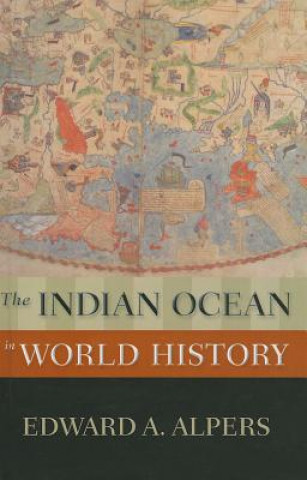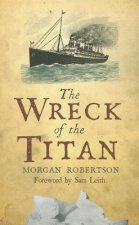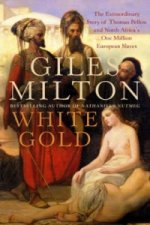
Kód: 04516039
Indian Ocean in World History
Autor Edward A. Alpers
The Indian Ocean remains the least studied of the world's geographic regions. Yet there have been major cultural exchanges across its waters and around its shores from the third millennium B.C.E. to the present day. Historian Edwa ... celý popis
- Jazyk:
 Angličtina
Angličtina - Väzba: Pevná
- Počet strán: 184
Nakladateľ: Oxford University Press Inc, 2014
- Viac informácií o knihe

Mohlo by sa vám tiež páčiť
-

I'm Not Sleepy
9 € -13 % -

Ascent of Mount Carmel
17.70 € -

Interactive Level 3 Class Audio CDs (3)
73.40 € -2 % -

Opera in Theory and Practice, Image and Myth
120.40 € -

O God of Players
142.92 € -

Encounters with Modernity
189.20 € -

Heidegger
37.46 €
Darujte túto knihu ešte dnes
- Objednajte knihu a vyberte Zaslať ako darček.
- Obratom obdržíte darovací poukaz na knihu, ktorý môžete ihneď odovzdať obdarovanému.
- Knihu zašleme na adresu obdarovaného, o nič sa nestaráte.
Viac informácií o knihe Indian Ocean in World History
Nákupom získate 394 bodov
 Anotácia knihy
Anotácia knihy
The Indian Ocean remains the least studied of the world's geographic regions. Yet there have been major cultural exchanges across its waters and around its shores from the third millennium B.C.E. to the present day. Historian Edward A. Alpers explores the complex issues involved in cultural exchange in the Indian Ocean Rim region over the course of this long period of time by combining a historical approach with the insights of anthropology, art history, ethnomusicology, and geography. The Indian Ocean witnessed several significant diasporas during the past two millennia, including migrations of traders, indentured laborers, civil servants, sailors, and slaves throughout the entire basin. Persians and Arabs from the Gulf came to eastern Africa and Madagascar as traders and settlers, while Hadramis dispersed from south Yemen as traders and Muslim teachers to the Comoro Islands, Zanzibar, South India, and Indonesia. Southeast Asians migrated to Madagascar, and Chinese dispersed from Southeast Asia to the Mascarene Islands to South Africa. Alpers also explores the cultural exchanges that diasporas cause, telling stories of identity and cultural transformation through language, popular religion, music, dance, art and architecture, and social organization. For example, architectural and decorative styles in eastern Africa, the Red Sea, the Hadramaut, the Persian Gulf, and western India reflect cultural interchanges in multiple directions. Similarly, the popular musical form of taarab in Zanzibar and coastal East Africa incorporates elements of Arab, Indian, and African musical traditions, while the characteristic frame drum (ravanne) of sega, the widespread Afro-Creole dance of the Mascarene and Seychelles Islands, probably owes its ultimate origins to Arabia by way of Mozambique. The Indian Ocean in World History also discusses issues of trade and production that show the long history of exchange throughout the Indian Ocean world; politics and empire-building by both regional and European powers; and the role of religion and religious conversion, focusing mainly on Islam, but also mentioning Hinduism, Buddhism and Christianity. Using a broad geographic perspective, the book includes references to connections between the Indian Ocean world and the Americas. Moving into the twentieth and twenty-first centuries, Alpers looks at issues including the new configuration of colonial territorial boundaries after World War I, and the search for oil reserves.
 Parametre knihy
Parametre knihy
Zaradenie knihy Knihy po anglicky Humanities History History: specific events & topics
159.41 €
- Celý názov: Indian Ocean in World History
- Autor: Edward A. Alpers
- Jazyk:
 Angličtina
Angličtina - Väzba: Pevná
- Počet strán: 184
- EAN: 9780195165937
- ISBN: 0195165934
- ID: 04516039
- Nakladateľ: Oxford University Press Inc
- Hmotnosť: 400 g
- Rozmery: 238 × 162 × 15 mm
- Dátum vydania: 16. January 2014
Obľúbené z iného súdka
-

Man's Search for Meaning
7.05 € -7 % -

Women, Race & Class
10.23 € -21 % -

Pianist
10.23 € -29 % -

Out Of Place
12.28 € -23 % -

Little History of Economics
14.94 € -8 % -

Laughter in Ancient Rome
20.26 € -11 % -

Civilization and Capitalism, 15th-18th Century
67.57 € -

Armies of Medieval Burgundy 1364-1477
15.96 € -15 % -

Night
10.13 € -22 % -

Society of the Spectacle
11.76 € -

Imperialism: The Highest Stage of Capitalism
7.98 € -22 % -

Man's Search For Meaning
16.58 € -23 % -

Homo Deus
12.48 € -22 % -

Ordinary Men
10.95 € -24 % -

Black Earth
12.99 € -23 % -

The Complete MAUS
18.73 € -14 % -

The Rape of Nanking
16.06 € -23 % -

Madness and Civilization
17.91 € -8 % -

Conquerors
11.87 € -18 % -

Stoned
11.15 € -23 % -

Twelve Years a Slave
3.57 € -24 % -

At Home
12.28 € -23 % -

Origins of Museums
58.96 € -17 % -

Measure of a Man
14.53 € -

Delirious New York
30.19 € -16 % -

Eichmann in Jerusalem
11.05 € -23 % -

Mein Kampf - The Ford Translation
41.87 € -

Bloodlands
12.89 € -24 % -

Guns, Germs and Steel
12.79 € -24 % -

Cold War Submarines
37.26 € -19 % -

Fall of Public Man
16.58 € -23 % -

Che Guevara
24.87 € -13 % -

Dancing In The Streets
12.28 € -23 % -

Fix the Pumps
14.73 € -19 % -

Blue
38.18 € -7 % -

Revolutionary Yiddishland
13.61 € -14 % -

Commandant Of Auschwitz
12.28 € -23 % -

Jewish State
11.76 € -4 % -

Eichmann in Jerusalem
15.35 € -21 % -

Reflections on the Revolution in France
10.13 € -22 % -

Wall Street and the Bolshevik Revolution
14.43 € -23 % -

Corgi Toys
17.40 € -5 % -

Night
11.15 € -23 % -

Wreck of the Titan
13.20 € -18 % -

McMafia
12.28 € -23 % -

Intimate History of Humanity
14.43 € -23 % -

Feminism: A Very Short Introduction
10.13 € -22 % -

White Gold
14.43 € -23 % -

Twelve Who Ruled
24.05 € -14 %
Osobný odber Bratislava a 2642 dalších
Copyright ©2008-24 najlacnejsie-knihy.sk Všetky práva vyhradenéSúkromieCookies



 19 miliónov titulov
19 miliónov titulov Vrátenie do mesiaca
Vrátenie do mesiaca 02/210 210 99 (8-15.30h)
02/210 210 99 (8-15.30h)